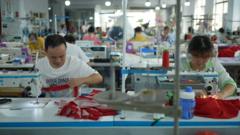In the wake of Trump's tariffs rising to 104%, China's government appeals to nations worldwide for solidarity against what it calls 'trade tyranny'. As Chinese exporters struggle with the financial impact on their operations and profit margins, Beijing is exploring partnerships with regional allies and assessing its own responses to these stark trade challenges.
Global Response to Trump's Tariffs: China Calls for Unity Against 'Trade Tyranny'

Global Response to Trump's Tariffs: China Calls for Unity Against 'Trade Tyranny'
Amidst escalating tariffs imposed by the Trump administration, China urges international cooperation to counteract the economic ramifications faced by its exporters.
China has reacted strongly to the recent imposition of tariffs by the Trump administration, which have surged to an unprecedented 104%. As major Chinese exporters such as fast-fashion giant Shein face crippling financial pressure, the Chinese government is calling for global united fronts against what it labels as "trade tyranny." An editorial from the state-operated China Daily emphasizes the need for cooperation among nations, particularly highlighting collaborations with Japan, South Korea, and other Asian economies as essential in opposing these levies.
Lin Jian, a spokesperson for the Chinese foreign ministry, firmly stated that China "opposes and will never accept such hegemonic and bullying practices." This sharp rhetoric comes at a particularly challenging time for China's economy, as domestic consumption is weak and exports are pivotal for economic growth. The sweeping nature of the tariffs has further complicated matters, forcing businesses to recalibrate their supply chains amid great uncertainty. As a cross-border logistics business owner noted, the increased tariffs cut into already slim profit margins, exacerbating operational costs for manufacturers and sellers alike.
Industry experts express concern that any tariffs exceeding 35% could obliterate the profits Chinese businesses might earn when exporting to the U.S. or other Southeast Asian markets. Dan Wang, a consultant at Eurasia Group, emphasizes that the impacts of these tariffs could severely hinder growth since exports have historically accounted for 20% to 50% of growth in the post-COVID period. While retaliatory measures from the Chinese government have yet to be explicitly announced, there are reports of potential punitive actions against U.S. entities, such as restricting Hollywood films and halting cooperative measures on fentanyl.
The toll of these tariffs extends to companies like Fuling, which produces disposable tableware for U.S. fast food chains. With roughly two-thirds of its revenue linked to the U.S. market, the new tariffs present considerable risks. In a bid to alleviate the pressure, Fuling established a factory in Indonesia, only to face newer challenges as exports are now subject to a 32% levy.
President Trump's recent tariff announcements, which also affect a variety of countries including Cambodia (49%), Vietnam (46%), and Thailand (36%), have raised alarms among economists who predict potential recessions in the U.S. and globally. These fees are part of an overarching strategy aimed at bolstering the American economy, according to Trump, but the broader implications of such tariffs have raised concerns, even drawing criticism from influential business figures like Elon Musk.
Trump's comprehensive tariff strategy has intensified following tit-for-tat responses from Beijing. However, economic analysts suggest that these tariffs may ultimately push China to restructure its economy towards greater reliance on domestic consumption. The longer-term sustainability of such trade barriers remains in question, and as the economic landscape shifts, it prompts serious considerations about the consequences for global trade dynamics.
In summary, as both countries navigate this fraught landscape of trade, businesses on both sides are bracing for a potentially protracted and tumultuous battle, with far-reaching implications for the world's economy.




















